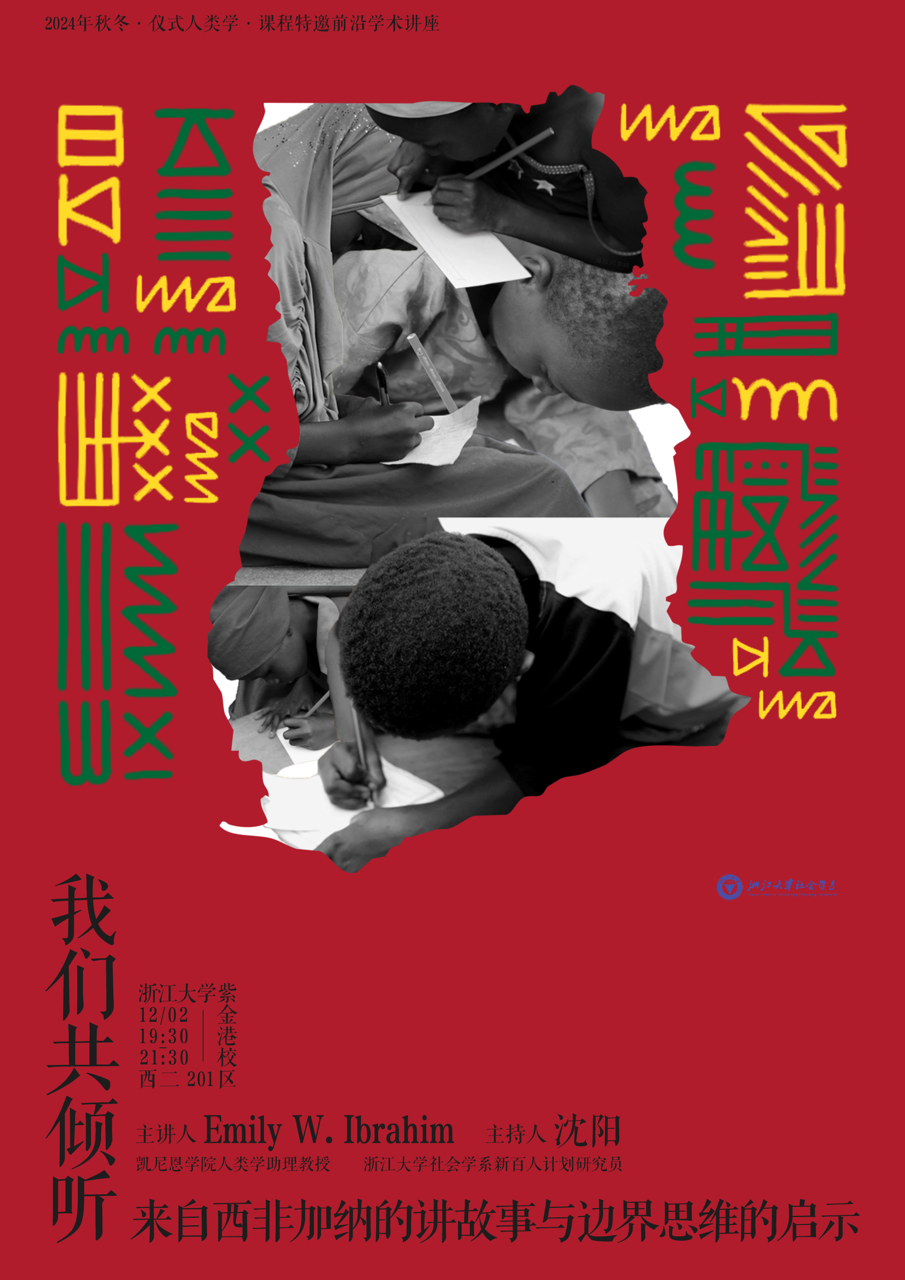
讲 座 信 息
题目:我们共倾听:来自西非加纳的讲故事与边界思维的启示
时间:2024年12月2日(周一)19:30-21:30
地点:浙江大学紫金港校区西二教学楼201
摘要:我们如何倾听并学习彼此的生命,特别是那些距离我们有些遥远的生命?正如尼日利亚小说家阿契贝(Chinua Achebe)曾对他的学生所说:“要与一个和你很像、譬如就住在你隔壁的人产生共鸣,并不难。更难的是与那些你看不到的人共鸣——那些距离遥远、肤色不同、饮食习惯迥异的人。当你开始做到这一点时,文学才真正展现出它的奇迹”(Achebe 2000)。受到阿契贝的启发,Emily Ibrahim 回顾了自己在西非加纳与年轻学习者共同设计和合作开展讲故事项目的经历。这些项目的主要教学方法就是讲故事,旨在启发学生更深入地了解自己和彼此,培养批判性思维,挑战主流叙事,打破对加纳的刻板印象,并推动包容性的读写教育。
结合文学教育、文化理论与人类学中的讲故事研究,Ibrahim 探讨了以下问题:我们如何培育一个[跨]文化的教学框架,使其能认可加纳学生的生命意义(Spencer & Ullucci, 2022),并如本尼迪克特(Ruth Benedict)所言,“让世界成为一个包容人类差异的地方”(Benedict 1946)?为什么讲故事是一种特别适合培养尊严、宽容和想象力的学习媒介?结合Gloria Anzaldúa(1987)和Walter Mignolo(2011)的去殖民理论,讲故事在知识生产方面有什么潜力?它如何为“边界意识”的形成提供契机,从而带来挑战欧洲中心主义和殖民遗产的新认知方式?
We Are All Ears: Lessons in Story-telling and Border-thinking from Ghana, West Africa
How do we listen to and learn from one another’s lives, especially those that are far away? As Nigerian novelist Chinua Achebe once explained to his students, “It’s not difficult to identify with somebody like yourself, somebody next door who looks like you. What's more difficult is to identify with someone you don't see, who's very far away, who's a different color, who eats a different kind of food. When you begin to do that then literature is really performing its wonders” (Achebe 2000). Inspired by his statement, Emily Ibrahim reflects upon her experiences designing and implementing storytelling initiatives with young learners in Ghana, West Africa. Employing storytelling as the primary learning and teaching tool, these projects seek to empower students to cultivate a deeper understanding of themselves and one another, engage critical thinking, challenge dominant narratives, break down stereotypes about Ghana, and promote inclusive literacy.
In conversation with literature in education, cultural theory, and the anthropology of storytelling, Ibrahim addresses the following questions: How do we cultivate a [trans]cultural pedagogical framework for teaching and learning that, as Ruth Benedict once put it, “makes the world safe for human differences” (Benedict 1946) and affirms the lives of Ghanaian students (Spencer & Ullucci, 2022)? Why is storytelling a particularly useful pedagogical instrument for engendering dignity, tolerance, and the imagination? And drawing upon the decolonial theory of Gloria Anzaldúa (1987) and Walter Mignolo (2011), what is the epistemic potential of storytelling to cultivate a “borderland consciousness” – the possibility of ushering in new ways of knowing that challenge Eurocentrism and the legacies of colonialism?
主讲人:Emily Williamson Ibrahim,凯尼恩学院人类学系助理教授
研究重点为豪萨语中被称为“折叠语言”的创意沟通形式,用以理解人们如何在加纳西部的城市社区应对主体间的不确定性。 Emily Ibrahim是波士顿大学人类学博士,麻省理工学院与弗吉尼亚大学建筑学硕士。她曾作为建筑师参与在加纳、秘鲁和海地的文化遗产项目,并在布兰代斯大学教授人类学、在罗德岛设计学院(RISD)教授景观建筑学。Emily共同创办了“宗戈故事项目”(Zongo Story Project),与加纳的学生一起编写、插画、讲述对他们有意义的故事。2016年这个项目的作品集《吉佐吉佐:宗戈湖的故事》获美国非洲研究协会最佳儿童图书奖(Africana Book Award)。Emily的部分出版作品包括:对Prita Meier的《斯瓦希里港口城市:他乡的建筑》(Swahili Port Cities: The Architecture of Elsewhere)的评论(H-AMCA:人文学科与社会科学在线,2017);“理解宗戈:加纳边缘化的社会空间过程”(《非洲大都市》一书,由Toyin Falola和Bisola Falola编辑,2017年);《宗戈:水基础设施与公共生活》(《芝加哥大学艺术期刊》,2010年)等。
主持人:沈阳,浙江大学社会学系新百人计划研究员
波士顿大学人类学博士,研究领域主要包括宗教人类学(含世俗主义相关问题)、仪式与社会理论、知识论等。其研究发表在Material Religion, Journal of Chinese Humanities等杂志上。